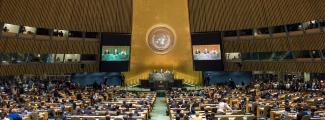
New York (United Nations), 14 December 2024 (SPS) – On the occasion of the 64th anniversary of the adoption by the UN General Assembly of its resolution 1514 on the Declaration on the Granting of Independence to Colonial Countries and Peoples, the Frente POLISARIO Representation at the United Nations issued a Press Release highlighting the historical, legal and political significance of this resolution, which constitutes the cornerstone of UN policy towards the territories that are still colonised, including Western Sahara.
The Press Release pointed out that the new aggression unleased by Morocco, the occupying state, since 13 November 2020 has once again forced the Sahrawi people to resume their legitimate struggle, which had been recognised and supported by the General Assembly in its resolutions, including resolution 2983 (XXVII) of 14 December 1972, in which the General Assembly reaffirmed its solidarity with, and support for, the Sahrawi people in their struggle for exercising their right to self-determination and independence and requested all States to give the Sahrawi people all essary moral and material assistance in their struggle.
The full text of the Press Release as received by SPS:
FRENTE POLISARIO REPRESENTATION AT THE UNITED NATIONS
PRESS RELEASE
On the Commemoration of the 64th Anniversary of UN General Assembly Resolution 1514
[New York, 14 December 2024] Today the United Nations and all world nations mark the 64th anniversary of the adoption by the General Assembly of its resolution 1514 (XV), on 14 December 1960, on the Declaration on the Granting of Independence to Colonial Countries and Peoples.
By its resolution 1514 (XV), the General Assembly recognised that the subjection of peoples to alien subjugation and domination constituted a denial of fundamental human rights, was contrary to the Charter of the United Nations and was an impediment to the promotion of world peace and cooperation. It solemnly proclaimed the necessity of bringing to a speedy and unconditional end colonialism in all its forms and manifestations.
At present, the Special Committee on Decolonisation (C-24) includes on its list 17 Non-Self-Governing Territories including Western Sahara, the last colony in Africa, whose decolonisation was obstructed by Morocco’s military invasion and occupation of the Territory in 1975, which was deeply deplored by the General Assembly in its resolutions 34/37 of 21 November 1979 and 35/19 of 11 November 1980, among others.
More than six decades have passed since the General Assembly adopted its resolution 1956 (XVIII) of 11 December 1963 whereby the General Assembly included Western Sahara on the list of the Non-Self-Governing Territories falling within the scope of Chapter XI of the UN Charter, thus recognising the international status of Western Sahara as a decolonisation issue and consequently the inalienable right of the Sahrawi people right to self-determination and independence to be exercised in accordance with General Assembly resolution 1514 (XV) and other relevant resolutions.
However, the decolonisation of Western Sahara remains unfinished owing to the obstructionism of the Morocco, the occupying state, coupled with the inaction of the international community, which has thus far emboldened the occupying state not only to persist in its illegal occupation of parts of Western Sahara but also to violate and torpedo the 1991 ceasefire on 13 November 2020, causing the collapse of the UN peace process and plunging the region into yet another spiral of violence and instability.
In the face of the new aggression unleashed by the occupying state of Morocco, the Sahrawi people have again been forced to resume their legitimate struggle that the General Assembly had recognised and supported in its resolutions, including resolution 2983 (XXVII) of 14 December 1972 in which the General Assembly reaffirmed its solidarity with, and support for, the Sahrawi people in their struggle for exercising their right to self-determination and independence and requested all States to give the Sahrawi people all necessary moral and material assistance in their struggle.
It is therefore imperative that the United Nations and its relevant organs redouble their efforts to bring about the decolonisation of Western Sahara based on the free and democratic exercise by the Sahrawi people of their inalienable, non-negotiable and imprescriptible right to self-determination and independence in accordance with General Assembly resolution 1514 (XV). (Sps)